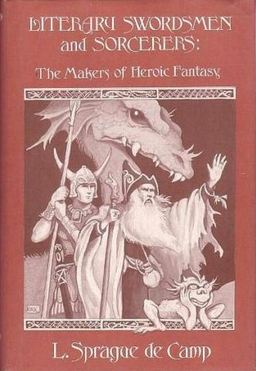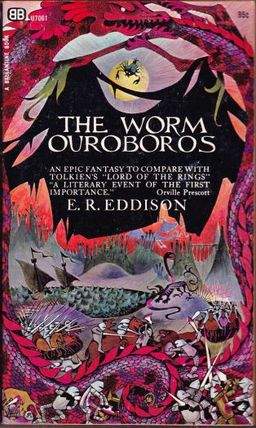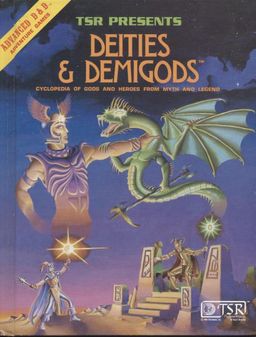Where Did Fantasy Come From? A Review of Literary Swordsmen and Sorcerers: The Makers of Heroic Fantasy by L. Sprague de Camp
 I love fantasy literature. And I’m greatly interested in its history as well. Where did fantasy come from? Is Tolkien solely to blame? How does King Arthur and his round table knights enter in? What about this business with elves and dwarves? Am I the only one who thinks about where this stuff came from?
I love fantasy literature. And I’m greatly interested in its history as well. Where did fantasy come from? Is Tolkien solely to blame? How does King Arthur and his round table knights enter in? What about this business with elves and dwarves? Am I the only one who thinks about where this stuff came from?
As far as I can tell, there are very few fantasy histories out there and not much more than cursory stabs at explaining how we have the fantasy literature that we do. (For a couple of very good ones though, see the introductions to David G. Hartwell and Jacob Weisman’s The Sword and Sorcery Anthology and Jonathan Strahan and Lou Anders’s Swords and Dark Magic.) So, when I recently stumbled across a whole book devoted to the history of fantasy, I grabbed it!
The book in question is Literary Swordsmen and Sorcerers: The Makers of Heroic Fantasy by (now deceased) L. Sprague de Camp, originally published by Arkham House Publishers in 1976. Even if you haven’t been an SF&F (science fiction and fantasy) fan very long, you’ve undoubtedly come across de Camp’s name.
De Camp was one of the most prolific SF&F writers of the twentieth century. He wrote both fantasy and science fiction, as well as non-fiction. I first came across de Camp through my interest in Lovecraft. He seems to have been the first person to have written a biography of H. P. Lovecraft — one that unfortunately has not aged well. But it’s clear that de Camp was very interested in the history of SF&F and particularly fantasy.
I’m not enough of an historian to be able to criticize Literary Swordsmen and Sorcerers on a scholarly level; but as far as being engaging and informative, de Camp’s book is superb. I found it to be incredibly engrossing — one of those books that are hard to put down.
Lin Carter — another prolific twentieth century SF&F writer — gives a fairly long and informative introduction. It simply whets your appetite for what is to follow.
 De Camp’s book is separated into chapters, each of which (besides the first) deals exclusively with a single author that he believes is responsible, to some degree, for the genre of fantasy literature, or at least as perceived in 1976. De Camp does a splendid job of covering the biographies of these writers in summary fashion, as well as discussing which of their works are better or more influential.
De Camp’s book is separated into chapters, each of which (besides the first) deals exclusively with a single author that he believes is responsible, to some degree, for the genre of fantasy literature, or at least as perceived in 1976. De Camp does a splendid job of covering the biographies of these writers in summary fashion, as well as discussing which of their works are better or more influential.
Some of these authors are familiar and are still recognized as major contributors to the fantasy field, such as: William Morris, Lord Dunsany, J. R. R. Tolkien, and Robert E. Howard.
Other chapters, however, are quite surprising, and perhaps a little puzzling.
I’m not sure if this reflects de Camp’s own biases, or whether this is an indication of where fantasy literature was in the mid-70s. Some of de Camp’s more surprising choices are H. P. Lovecraft, Clark Ashton Smith, and T. H. White. He also has chapters on E. R. Eddison and Fletcher Pratt — neither of which I was familiar with before reading this book.
Morris, Dunsany, Tolkien, and Howard are all obvious choices. It’s clear that many recognize Tolkien and Howard as major contributors to the fantasy field. My guess is that Morris and Dunsany are perhaps less remembered today; and personally I’ve never read any of Morris’s work.
I take the chapters on Lovecraft, Smith, and White to be a little more idiosyncratic though. White’s The Once and Future King is still one of the classic Arthurian tales and is still in print, but I’m not sure how influential White is overall to fantasy. There have been many other takes on Camelot. Perhaps White’s was the most notable in de Camp’s view.
Lovecraft and Smith, on the other hand, I think are more widely recognized as horror writers today (though Smith is notable for his poetry as well).
And no doubt Lovecraft’s monsters and deities have had a big influence on fantasy. In fact, I first encountered Lovecraft at 13 years of age when I purchased the Dungeons and Dragons book Deities and Demigods.
 Again, I was not familiar with Eddison and Pratt. But de Camp makes a good case for why they were influential, at least in his time.
Again, I was not familiar with Eddison and Pratt. But de Camp makes a good case for why they were influential, at least in his time.
In some ways, even putting aside the fact that these authors may have been more recognized in the mid-70s, de Camp’s book seems a bit of a hodgepodge. The copyright page shows that almost every chapter was originally, or at least in part, an article published earlier.
Cynically, one might think this book was just an excuse to cobble together some of de Camp’s work. More optimistically — and I think this is actually the case — de Camp believed that these various authors were highly influential to the fantasy genre.
If one were to put together such a book today, I’m sure several of these authors would probably fall out. And putting aside some “big names” that we’ve acquired in recent years, we would still have some obvious inclusions: two that I suggest would be Michael Moorcock and Fritz Leiber.
Nevertheless, de Camp’s book is a very interesting and informative history of fantasy. I wish there was a contemporary version, or something close to it, around today.
Does anyone know of any other good histories of fantasy literature?
Not a history in the same sense, but Lin Carter’s Imaginary Worlds, which John mentioned in a recent post, makes an excellent companion work.
There’s also Fantasists on Fantasy edited by Robert H. Boyer and Kenneth J. Zahorski, a collection of essays by everyone from George MacDonald to J.R.R. Tolkien to Ursula K. le Guin to Michael Moorcock.
https://www.goodreads.com/book/show/1584922.Fantasists_on_Fantasy?from_search=true
But that’s also pretty old — 1984. I’d love to find something more current.
In terms of modern fantasy, I always think of two key influences: the ‘Weird Tales’ magazine (specifically contributors Howard and Clark Ashton Smith) and Tolkien. Moorcock’s work was written largely in response to Howard’s – I remember reading somewhere that his effete heroes were intended to be the inverse of the bluff, muscle-bound Conan.* It’s interesting that you say Smith is now known primarily for his horror stories, as I would associate him with tales like ‘The Maze of Maal Dweb’ and ‘The Empire of the Necromancers’, both clearly fantasy stories. But then I’m defining modern fantasy as either epic or sword-and-sorcery, and ignoring children’s fantasy (which I believe to be every bit as important as its adult equivalent, if not more so) and fantasy that is simply quirky and strange (e.g. ‘The Last Unicorn’).
* Whatever Moorcock’s reasons, it’s interesting to notice how his characters are generally of noble birth while Conan’s narrative is that of the self-made man. Is this because these are the values that most appeal to their English and American readers respectively? I wonder.
@Joe H.
Thanks for the lead on Fantasists on Fantasy. I had never heard of that one before.
I just finished the Carter book and hopefully I’ll be able to give a review of it sometime soon.
If you’re interested, there’s a couple of others that I’ve run across since reading de Camp’s book. One is Michael Moorcock’s Wizardry and Wild Romance and A Short History of Fantasy by Farah Mendlesohn and Edward James. The last one I’m currently reading and looking forward to giving a review of as well.
Again, thanks for the tip.
Wizardry and Wild Romance, while an interesting set of essays, was too colored by his politics, his hatred of Tolkien and his man crush on Mervyn Peake and M John Harrison.
I was also surprised, that for such an accomplished author, for most of his arguments, he uses long passages of the offending work and says “see, that’s what I’m talking about.”
I think I have Wizardry and Wild Romance somewhere, maybe in another Moorcock collection? I think I had a similar reaction to Bobby above.
Short History of Fantasy sounds interesting — I look forward to your review.
The funny thing about that book is that Moorcock is quick to point out the inherent class snobbery that defines ‘The Hobbit’ and LOTR, while being largely blind to Peake’s shortcomings in this respect – maybe because he had tea with the Peakes while still a young fellah?
I’ve heard many different people express similar frustrations or misgivings about Moorcock’s views in that book. And yes, I’ve also heard that he has something of an anti-establishment agenda in expressing his views there.
Nevertheless, I’m interested in reading it too. He’s one of my favorite sword and sorcery authors of all time. At the very least, I think it might show where the New Wave of SF&F was at in the 1960s. Cultural markers are important even when we may not care for or share their view.
Yeah, he definitely has interesting points to make and it’s worth checking out; you just have to be aware of his … biases.
The thing that most struck me about Wizardry and Wild Romance was its obsession about being grown-up. That which was approved of was adult; that which was not was adoloscent.
Never before or since read a work so vulnerable to C. S. Lewis’s charge:
“Critics who treat ‘adult’ as a term of approval, instead of as a merely descriptive term, cannot be adult themselves. To be concerned about being grown up, to admire the grown up because it is grown up, to blush at the suspicion of being childish; these things are the marks of childhood and adolescence. And in childhood and adolescence they are, in moderation, healthy symptoms. Young things ought to want to grow. But to carry on into middle life or even into early manhood this concern about being adult is a mark of really arrested development.”
I’ve had this book for a while, and I’ve read parts of it, although not the entire thing. Coming from Howard fandom, I’m a little leery of de Camp’s scholarship. He, too, seemed to have an axe to grind in Dark Valley Destiny, the first Howard biography. (IMO Mark Finn’s Blood and Thunder provides a more balanced perspective.) Still, as long as you are award of an author’s biases, you can learned a lot from biographies and histories. Having said that, I think this volume is definitely one to have if you’re interested in the history of the field.
The only thing I had known about de Camp before coming to this book was that he also wrote a Lovecraft biography–one of the first as far as I can tell. Though it was a pretty big hit in his day, almost everyone lampoons it today for its inaccuracies.
So be it. De Camp wasn’t the greatest biographer. Nevertheless, I think this book shows that he was enthusiastic about these writers and it went some ways toward helping to popularize, or keep in people’s attention, on these writers and their works.
As I’ve said above, I plan on reviewing Moorcock’s Wizardry and Wild Romance. I’ll try to give it a fair shake as well. However, I’m going to review Lin Carter’s Imaginative Worlds first.
Thanks for all of the comments!
James, let me suggest for further information on many of these authors and their works, the introductions to many of the Ballantine Adult Fantasy series edited by Lin Carter are good resources. I’m going to be doing an occasional series of posts about that series starting in the next few weeks. I wanted to check with John before I said anything, just to make sure it was okay with him to announce that here. I’ll do a post about the series in general, then start looking at the books on an individual basis. I’ll skip around some, but the first few posts will be in order of publication. The first three authors are Pratt (The Blue Star), Dunsany (The King of Elfland’s Daughter), and Morris (The Wood Beyond the World). I’ll get to Eddison eventually. I read The Worm Ouroboros in college and enjoyed it. I’m curious to see how well it holds up after a quarter of a century.
@westkeith
Not in the comments section, but someone sent me a private email suggesting the very same thing: Lin Carter’ s introductions are fantastic in these Ballantine editions for giving background to the authors and fantasy in general.
I’m kinda bummed that you’re going to be posting on this series because I was going to suggest the same to Mr. O’Neill for myself. Darn it! You beat me to it!
However, I look forward to reading your posts.
Thanks. I’m looking forward to doing it. Maybe we could look at the same book from time to time and give different perspectives on it.
[…] recently did a review here at Black Gate of L. Sprague de Camp’s 1976 Literary Swordsmen and Sorcerers: The Makers of […]
[…] recently reviewed L. Sprague de Camp’s 1976 Literary Swordsmen and Sorcerers and Lin Carter’s 1973 Imaginary Worlds. As good as both were, I lamented that there didn’t seem […]